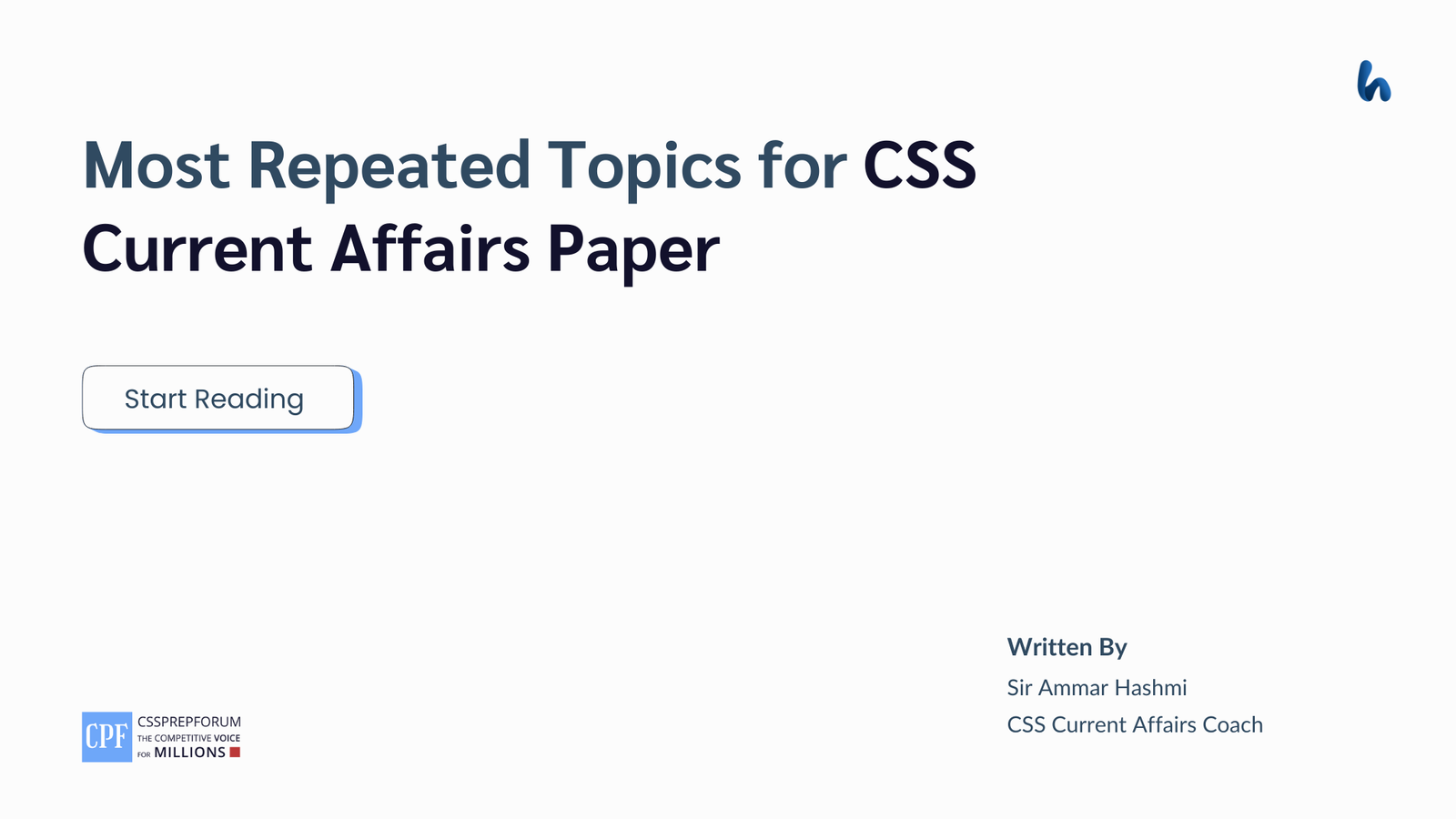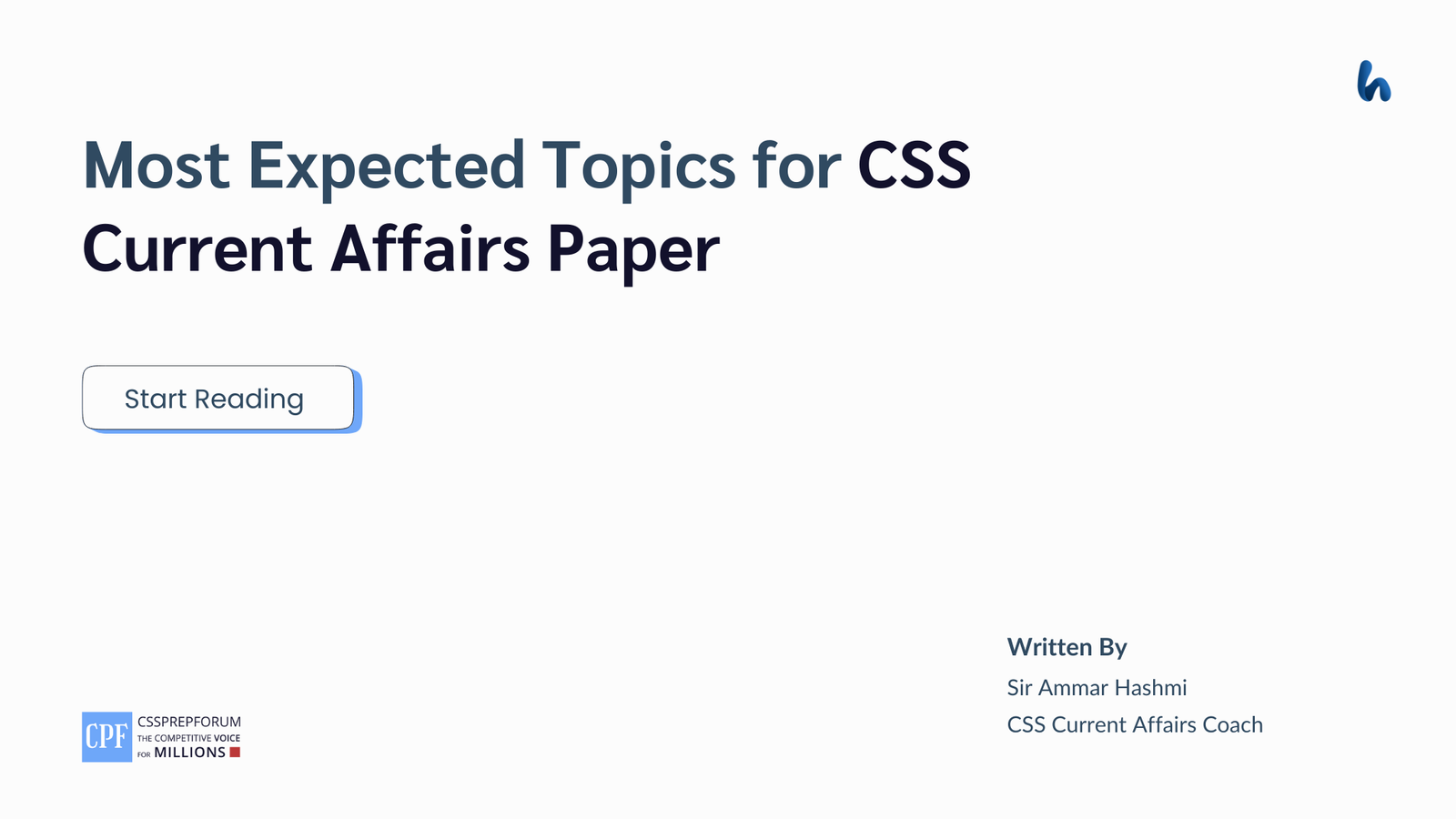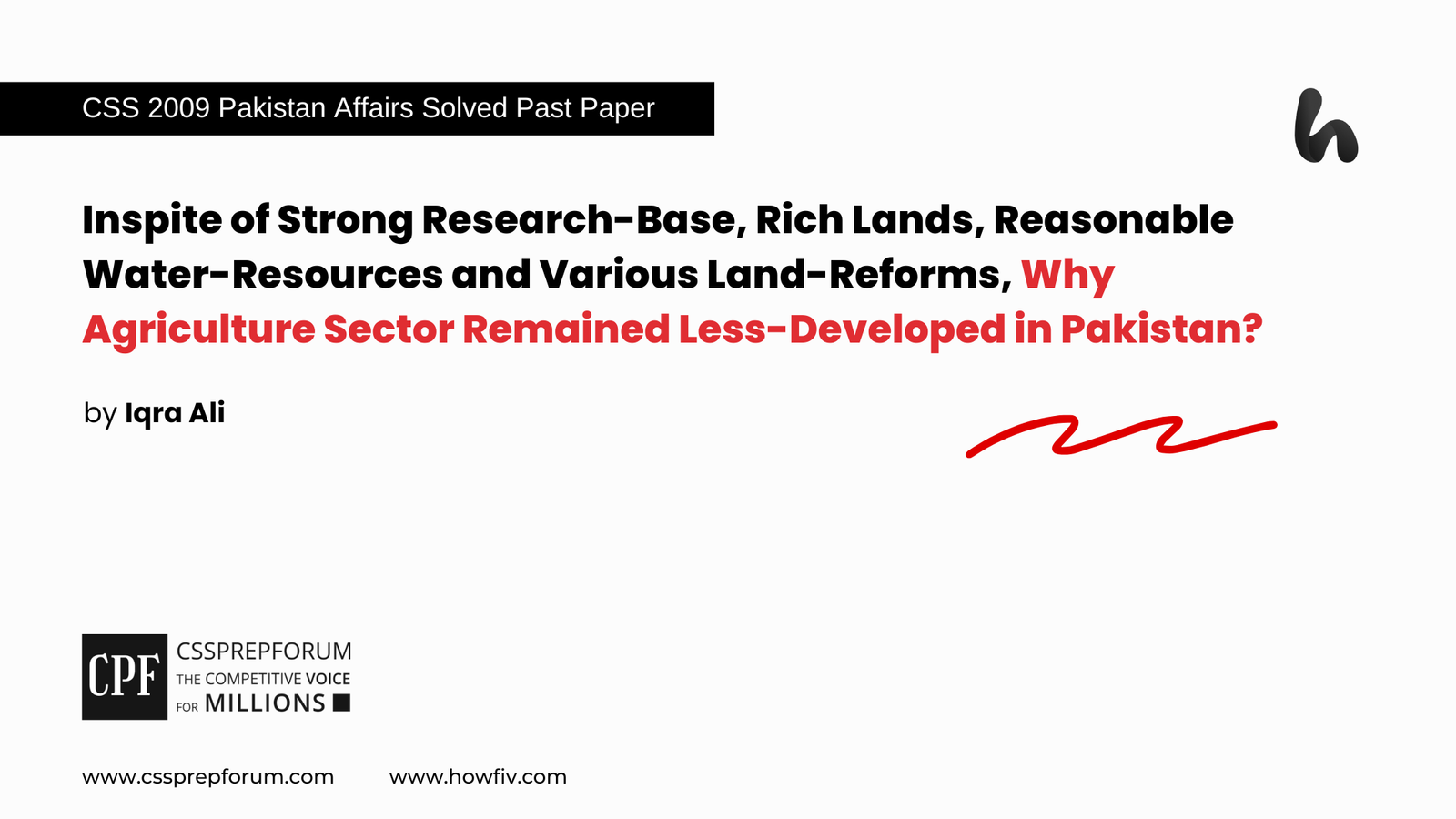CSS Solved Pakistan Affairs Past Papers 2023 | Pakistan Comprises the fifth-Largest Youth Bulge in the Country. Given this youth bulge deliberate the ways for sustainable Economic Development Progression of Pakistan.
The following question of CSS Pakistan Affairs 2023 is solved by Miss Nishat Afshan, Pakistan’s Best Pakistan Affairs Coach, on the guided pattern of Sir Syed Kazim Ali, which he taught to his students, scoring the highest marks in compulsory subjects for years. This solved past paper question is uploaded to help aspirants understand how to crack a topic or question, how to write relevantly, what coherence is, and how to include and connect ideas, opinions, and suggestions to score the maximum.

Outline
1- Introduction
2- Pakistan is the largest youth bulge country in the world
3- Way forward for Sustainable Economic development via youth bulge in Pakistan
4- Critical Analysis
5- Conclusion

Answer to the Question
Introduction
Pakistan, known as the fifth largest youth bulge country globally, faces a unique demographic challenge and opportunity. The term “youth bulge” refers to a significant proportion of young people within a population. With a large and growing youth population, Pakistan possesses immense potential for sustainable economic development. However, harnessing this potential requires careful consideration and deliberate strategies to ensure long-term prosperity. In this scenario it implicates the ways forward for sustainable economic development in Pakistan, taking into account the country’s youth bulge. By leveraging the energy, skills, and innovative thinking of its youth, Pakistan can build a robust and inclusive economy that benefits both the present and future generations. Through effective policies and targeted interventions, Pakistan can address the unique challenges posed by its youth bulge and pave the way for sustainable development. Pakistan’s youth bulge presents a unique opportunity to drive sustainable economic development. By investing in education, entrepreneurship, employment generation, infrastructure, social welfare, environmental sustainability, and implementing effective policies, Pakistan can pave the way for a prosperous and inclusive future. By nurturing and empowering the youth, Pakistan can leverage its demographic advantage and realize its full potential as an economically vibrant nation.
Pakistan as the largest youth bulge country in the world

Pakistan has a substantial youth population, with a significant proportion of its citizens falling within the age group of 15 to 29 years. According to the United Nations Population Fund (UNFPA), as of 2020, the youth population (15-29 years) in Pakistan accounted for nearly 35% of the total population, making it one of the countries with a considerable youth bulge. The youth bulge in Pakistan carries both opportunities and challenges. On the positive side, a large youth population can serve as a demographic dividend, contributing to economic growth, innovation, and social development. The energy, talents, and potential of young people can be harnessed to drive sustainable economic progress, entrepreneurship, and technological advancements. However, realizing the full potential of the youth bulge requires addressing various challenges. These challenges include ensuring access to quality education, skill development, employment opportunities, and social welfare. Pakistan needs to invest in education infrastructure, vocational training programs, and initiatives that promote entrepreneurship and innovation, enabling the youth to actively participate in the economy and contribute to its growth.
Furthermore, it is crucial to provide an enabling environment that supports youth engagement, empowers young people, and ensures their voices are heard in decision-making processes. By involving the youth in policy formulation, fostering their leadership skills, and creating platforms for their active participation, Pakistan can benefit from their fresh perspectives and ideas. Sustainable economic development strategies must also take into account the unique needs and aspirations of the youth. This includes addressing issues such as income inequality, social disparities, and access to healthcare while promoting inclusive growth and social cohesion.
The way forward for Sustainable Economic development via youth bulge in Pakistan

The youth bulge in Pakistan presents a unique opportunity for sustainable economic development. To harness the potential of this demographic advantage, several key strategies can be pursued:
- Education and Skill Development:
Investing in quality education and skill development programs is crucial. Enhancing access to education, improving the quality of teaching, and aligning curricula with market demands will equip the youth with the necessary knowledge and skills for productive employment. Vocational training programs should be expanded to address specific industry needs and promote entrepreneurship.
- Entrepreneurship and Innovation:
Promoting entrepreneurship among the youth can foster economic growth and job creation. Providing mentorship, access to finance, and business development support can encourage young entrepreneurs to start their ventures. Innovation ecosystems should be nurtured, including the establishment of incubators, technology parks, and research centres to encourage the development and adoption of new technologies.
- Employment Generation:
Creating sufficient employment opportunities is vital for the youth to participate meaningfully in the economy. Identifying sectors with high job creation potential, such as information technology, manufacturing, agriculture, and renewable energy, can drive economic growth and absorb the growing workforce. Encouraging investments, supporting small and medium-sized enterprises, and promoting public-private partnerships can enhance job prospects for the youth.
- Digital Connectivity and Technology Adoption:
Expanding digital connectivity and promoting technology adoption is essential for economic development. Enhancing access to affordable internet services, bridging the digital divide, and promoting digital literacy will empower the youth to leverage digital platforms for entrepreneurship, learning, and innovation. Embracing digital technologies across sectors can drive productivity and efficiency.
- Financial Inclusion and Access to Capital:
Facilitating financial inclusion for the youth is crucial. Developing accessible and affordable financial services, such as mobile banking and microfinance, can enable young entrepreneurs to access capital and investment opportunities. Encouraging financial literacy and entrepreneurship-focused financial products can empower the youth to pursue their business ventures.
- Infrastructure Development:
Investing in infrastructure, including transportation networks, energy systems, and telecommunications, is vital for economic development. Improved connectivity and efficient infrastructure can facilitate trade, reduce transaction costs, and attract investments. Public-private partnerships can play a significant role in financing and implementing infrastructure projects.
- Sustainable Agriculture and Rural Development:
Enhancing agricultural productivity and promoting rural development is essential for inclusive growth. Providing training, modernizing agricultural practices, and improving access to markets and credit facilities can empower young farmers. Diversifying rural economies through agro-processing, value addition, and promoting non-farm rural enterprises can create employment opportunities and reduce migration to urban areas.
- Environmental Sustainability:
Integrating environmental sustainability into economic development strategies is crucial for long-term prosperity. Encouraging sustainable practices, promoting renewable energy, and adopting clean technologies can mitigate environmental risks and ensure resource conservation. The youth can play an active role in advocating for environmental protection and climate change mitigation.
- Policy Reforms and Governance:
Enacting policy reforms that promote a conducive business environment, streamline regulatory processes, and ensure transparency and accountability is essential. The government should provide an enabling ecosystem for entrepreneurship, attract foreign direct investment, and support local businesses through targeted policies and incentives.
- Social Welfare and Inclusive Growth:
Prioritizing social welfare measures, including healthcare, education, and poverty alleviation programs, is critical for inclusive growth. Ensuring equal access to opportunities, reducing income inequality, and addressing social disparities will create a more equitable society and enable the youth to contribute effectively to the economy.
- Access to Affordable Housing:
Addressing the housing needs of the youth is crucial for their overall well-being and economic stability. Implementing policies and initiatives that promote affordable housing options, such as low-cost housing schemes and favourable mortgage financing, can enable young individuals to establish stable homes and contribute to local economies.
- Women Empowerment:
Promoting gender equality and empowering young women is essential for sustainable economic development. By ensuring equal access to education, skill development, employment opportunities, and entrepreneurship support, Pakistan can tap into the talents and potential of its female youth, driving economic growth and fostering social progress.
- Youth-Inclusive Policies and Programs:
Engaging the youth in policy formulation and decision-making processes is critical. Creating platforms for dialogue, involving youth representatives in advisory bodies, and establishing youth-led initiatives can enable young people to contribute their perspectives, ideas, and aspirations actively, leading to more effective and inclusive policies and programs.
- International Cooperation and Exchange Programs:
Encouraging international cooperation, student exchanges, and cultural programs can broaden the horizons of Pakistani youth. Collaboration with foreign countries, universities, and organizations can provide exposure to diverse ideas, experiences, and best practices, fostering innovation and expanding economic opportunities.
- Research and Development:
Prioritizing investment in research and development (R&D) can drive innovation and technological advancements. Establishing research institutes, promoting public-private collaborations in R&D, and providing grants and incentives for youth-led research initiatives can contribute to economic diversification, knowledge-based industries, and competitiveness.
- Quality Healthcare and Well-being:
Ensuring access to quality healthcare services and promoting overall well-being among the youth is vital. Investing in healthcare infrastructure, preventive care programs and mental health support can enhance productivity, reduce healthcare costs, and improve the overall quality of life for young individuals, enabling them to contribute more effectively to the economy.
- Cultural and Creative Industries:
Nurturing the cultural and creative industries can provide economic opportunities for young artists, musicians, writers, and designers. Supporting cultural events, festivals, and creative entrepreneurship can stimulate tourism, generate employment, and showcase Pakistan’s rich cultural heritage, contributing to economic growth and national identity.
- Public-Private Partnerships in Education and Skill Development:
Collaboration between the public and private sectors in education and skill development can improve the quality and relevance of training programs. Partnerships can involve private companies providing internships, apprenticeships, and on-the-job training, ensuring that the youth acquire practical skills and are prepared for the demands of the job market.
- Financial and Digital Literacy:
Promoting financial literacy and digital skills among the youth is crucial for their economic empowerment. Providing training on personal finance management, digital literacy, and online entrepreneurship can enhance financial decision-making, foster digital inclusion, and equip young individuals with the tools to navigate the digital economy effectively.
- Monitoring and Evaluation:
Establishing robust monitoring and evaluation mechanisms to track the progress of youth-focused programs and policies is essential. Regular assessment of the effectiveness and impact of initiatives can inform evidence-based decision-making, identify areas for improvement, and ensure accountability and transparency in youth development efforts.
- Public-Private Partnerships for Youth Employment:
Collaborating with the private sector to develop targeted youth employment programs can facilitate job placements, apprenticeships, and internships. Engaging businesses in skills development and providing incentives for youth employment can help bridge the gap between industry needs and youth skill sets.
- Rural Entrepreneurship and Agricultural Modernization:
Encouraging rural entrepreneurship and modernizing the agricultural sector can create employment opportunities for the youth in rural areas. Providing access to credit, training, and technology to young farmers can enhance productivity, promote value-added agriculture, and contribute to rural economic growth.
- Youth-led Social Enterprises:
Supporting and promoting youth-led social enterprises can address social and environmental challenges while generating economic value. Offering funding, mentorship, and incubation programs for youth-led initiatives can foster innovation and sustainability, providing a platform for young entrepreneurs to tackle societal issues.
- Soft Skills Development:
Besides technical skills, equipping the youth with soft skills such as communication, teamwork, problem-solving, and critical thinking is crucial. Integrating soft skills development into educational curricula and offering specialized training programs can enhance the employability and entrepreneurial abilities of the youth.
- Access to Market Information and Networks:
Facilitating access to market information, trade networks, and business opportunities is vital for young entrepreneurs. Developing online platforms, business directories, and networking events that connect youth entrepreneurs with potential clients, investors, and mentors can facilitate market entry and expansion.
- Youth-Friendly Regulatory Environment:
Creating a supportive regulatory environment for young entrepreneurs and startups can foster their growth and sustainability. Simplifying business registration processes, reducing bureaucratic hurdles, and offering tax incentives for youth-led businesses can encourage entrepreneurship and ease the burden of compliance.
- Mentorship and Role Models:
Establishing mentorship programs that connect experienced professionals with young individuals can provide guidance, inspiration, and networking opportunities. Encouraging successful entrepreneurs to serve as role models and share their stories can motivate and inspire the youth to pursue their entrepreneurial journeys.
- Cultural Exchange and Tourism Promotion:
Leveraging Pakistan’s rich cultural heritage and promoting tourism can create economic opportunities for the youth. Developing tourism infrastructure, supporting cultural festivals, and encouraging community-based tourism initiatives can generate employment in hospitality, tourism services, and artisanal industries.
- Financial Support for Youth Startups:
Offering financial support, grants, and venture capital specifically targeted at youth startups can help overcome the barriers to accessing capital. Establishing dedicated funds or youth entrepreneurship funds can provide the necessary financial resources to turn innovative ideas into viable businesses.
- Continuous Learning and Upskilling:
Promoting lifelong learning and upskilling opportunities for the youth is essential in a rapidly evolving economy. Encouraging the adoption of online learning platforms, organizing workshops and seminars, and providing scholarships for further education can empower young individuals to adapt to emerging trends and seize new opportunities.
Implementing these additional strategies can enhance the potential of Pakistan’s youth bulge and drive sustainable economic development. By fostering an enabling environment, providing support mechanisms, and tapping into the creativity and energy of the youth, Pakistan can secure a prosperous future for its young population and the nation as a whole.
Critical Analysis
While having a large youth population can be an asset for economic development, it is not the sole determining factor. The youth bulge needs to be complemented with effective policies, infrastructure, governance, and socio-economic conditions to realize its full potential. Merely having a youth bulge does not guarantee sustainable economic development without addressing underlying systemic challenges. Although education and skill development are mentioned as ways forward, it is important to emphasize the quality and relevance of education. Pakistan needs to focus on improving the educational system, ensuring access to quality education, and addressing the existing skills gap to meet the demands of a rapidly changing economy. Job creation is crucial, it is important to focus not only on quantity but also on quality employment opportunities. Simply creating jobs without ensuring decent work conditions, fair wages, and growth opportunities may result in underemployment or low job satisfaction among the youth.
Sustainable economic development should prioritize inclusive growth to ensure that the benefits reach all segments of society. Addressing income inequality, reducing disparities, and promoting social welfare programs are essential to create a more equitable society and provide opportunities for socio-economic mobility. Along the same vein, infrastructure development is vital, it must be balanced with sustainability considerations. Investments in infrastructure should align with environmental and social sustainability goals, such as promoting renewable energy, minimizing environmental impact, and enhancing resilience to climate change. Effective governance and efficient implementation of policies is critical for sustainable economic development. Pakistan needs to focus on improving governance mechanisms, transparency, accountability, and reducing corruption to ensure that policies are implemented effectively and resources are allocated efficiently. Similarly, Pakistan’s economic development is influenced by external factors such as global economic trends, trade policies, and geopolitical dynamics. To ensure sustainable economic development, Pakistan needs to actively engage in global markets, promote trade diversification, and foster regional cooperation.
Conclusion
Pakistan’s status as the fifth largest youth bulge country presents both opportunities and challenges for sustainable economic development. The sheer size and potential of its young population provide a strong foundation for driving economic growth, innovation, and progress. However, to fully harness this potential and ensure sustainable development, deliberate strategies and concerted efforts are required. Investing in education and skill development is paramount. Quality education, vocational training, and aligning curricula with market demands will equip the youth with the necessary knowledge and skills to contribute effectively to the economy. Entrepreneurship and innovation should be encouraged, with support systems and initiatives in place to nurture young entrepreneurs and facilitate the adoption of cutting-edge technologies.
Creating ample employment opportunities is crucial. By identifying sectors with high job creation potential, promoting investment, and supporting small and medium enterprises, Pakistan can address the pressing issue of unemployment and provide pathways to economic empowerment for its youth. Infrastructure development plays a pivotal role in sustainable economic growth. Enhancing transportation networks, expanding energy access, and improving telecommunications infrastructure will facilitate trade, productivity, and connectivity, thereby attracting investments and stimulating economic activities across the country. Social welfare measures and inclusive growth policies are essential for reducing income inequality and addressing the needs of marginalized segments of society. By implementing poverty reduction programs, ensuring equal access to resources and opportunities, and promoting social justice, Pakistan can create a more inclusive and equitable society.
Environmental sustainability must also be prioritized. Encouraging sustainable resource management, promoting renewable energy, and mitigating climate change will safeguard Pakistan’s natural resources for future generations while ensuring a resilient and environmentally conscious economy. Government policies and support play a vital role in enabling sustainable economic development. Reforms, regulatory frameworks, and incentives for foreign investment and local businesses are essential to creating a favorable business environment, stimulate economic growth, and attract the necessary resources and expertise.
CSS 2023 Solved Pakistan Affairs
CSS Solved Past Papers’ Essays
Looking for the last ten years of CSS and PMS Solved Essays and want to know how Sir Kazim’s students write and score the highest marks in the essays’ papers? Then, click on the CSS Solved Essays to start reading them.
CSS Solved Essays
CSS Solved General Science & Ability Past Papers
Want to read the last ten years’ General Science & Ability Solved Past Papers to learn how to attempt them and to score high? Let’s click on the link below to read them all freely. All past papers have been solved by Pakistan’s top CSS GSA coach having the highest score of their students.
General Science & Ability Solved Past Papers












